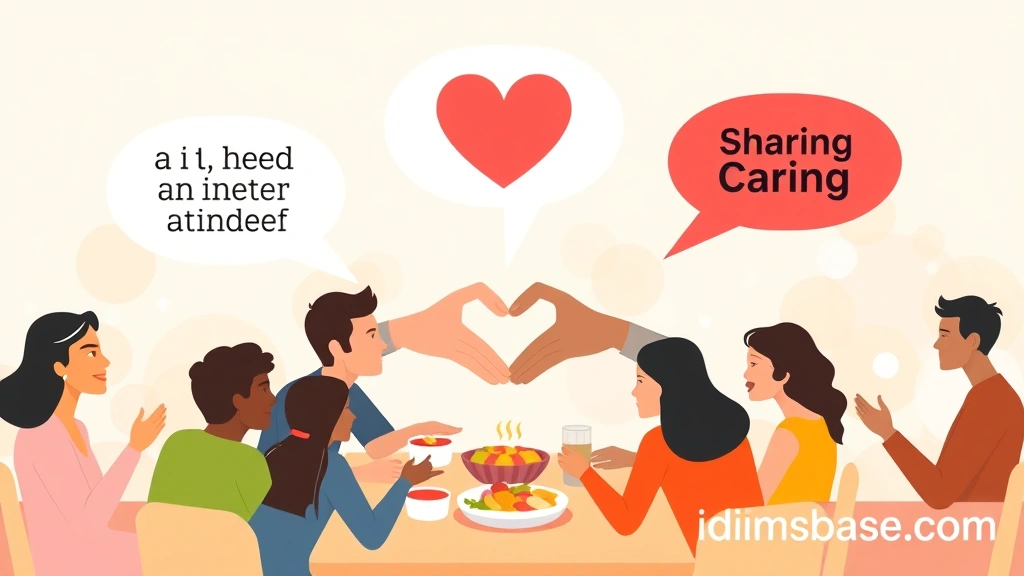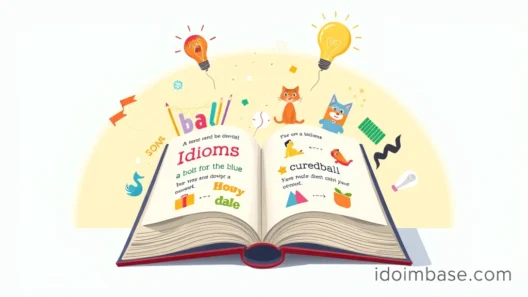Hey there, language lovers! Ready to sprinkle a little extra sparkle into your conversations? Today, we're diving headfirst into the wonderful world of idioms about sharing! You know, those quirky phrases that don't quite mean what they say literally, but beautifully capture the essence of giving, collaborating, and spreading joy. Whether you're a student, a professional, or just someone who loves to enrich their vocabulary, understanding these expressions will not only make your English more vibrant but also help you connect with others on a deeper level. So, grab a cup of your favorite beverage, get comfy, and let's unravel the delightful mysteries of 35 idioms about sharing!
Why Sharing Is Caring (and Communicating!)
Before we jump into our fantastic list, let's chat for a moment about why sharing is such a big deal, not just in life, but in language too. From a young age, we're taught the importance of sharing our toys, our snacks, and our time. As we grow, this concept expands to sharing ideas, responsibilities, and even emotions. It's a fundamental part of human connection and community building.
And guess what? Our language reflects this! Idioms about sharing aren't just random phrases; they're cultural snapshots that reveal how much we value generosity, teamwork, and mutual support. They add color, nuance, and a touch of wit to our everyday conversations. Imagine trying to explain complex social dynamics without these linguistic shortcuts! It would be like trying to bake a cake without flour – possible, but definitely not as delicious!
35 Idioms About Sharing: Your Ultimate Guide!
Alright, the moment you've been waiting for! Get ready to expand your linguistic toolkit with these fantastic idioms. We've categorized them a bit to make them easier to digest, but remember, many of them can fit into multiple contexts!
Idioms About Giving and Distributing
These idioms focus on the act of giving out, dividing, or distributing something among others.
- Share and share alike: This one is a classic! It means to divide something equally among all present, ensuring everyone gets a fair portion.
- Example: "There's only one pizza, so we'll have to share and share alike!"
- To divvy up: To divide something, usually money or resources, into portions and distribute them.
- Example: "After the successful project, the team decided to divvy up the bonus equally."
- To dole out: To distribute something, often sparingly or in small portions.
- Example: "The teacher had to dole out the art supplies carefully as there weren't many."
- To pass around: To circulate something among a group of people.
- Example: "Could you please pass around the appetizers? Everyone's hungry!"
- To hand out: To distribute something to a group of people, often one by one.
- Example: "Volunteers were busy handing out flyers for the charity event."
- To give a piece of your mind: While it sounds aggressive, this idiom means to express your strong opinion or criticism to someone, often because you're upset. It's "sharing" your thoughts, albeit forcefully!
- Example: "After being ignored, she decided to give him a piece of her mind about his behavior."
- To spread the word: To tell many people about something; to disseminate information.
- Example: "If you enjoyed the concert, please spread the word to your friends!"
- To put your two cents in: To offer your opinion or advice, even if not explicitly asked. It's sharing your thoughts!
- Example: "Everyone was debating the new policy, so I decided to put my two cents in."
- To open your heart: To reveal your true feelings and emotions to someone, often in a vulnerable way. It's sharing deep personal sentiments.
- Example: "She finally felt comfortable enough to open her heart to her best friend."
- To lay your cards on the table: To be completely honest and open about your intentions, plans, or resources. It's sharing your strategy.
- Example: "Before we negotiate, let's all lay our cards on the table so we know where we stand."
Idioms About Collaborative Sharing
These idioms highlight the aspect of working together, contributing, or having common experiences.
- To pull your weight: To do your fair share of work or contribute equally to a shared task.
- Example: "Everyone needs to pull their weight if we want to finish this project on time."
- To chip in: To contribute money, effort, or help to a common cause or shared expense.
- Example: "We all decided to chip in for a farewell gift for our boss."
- To go Dutch: To share the cost of something, especially a meal or entertainment, equally.
- Example: "Let's go Dutch tonight; it's easier for everyone."
- To meet halfway: To compromise with someone; for both parties to make concessions to reach an agreement. It's sharing the effort of compromise.
- Example: "We disagreed on the design, but we managed to meet halfway."
- To join forces: To combine efforts or resources with others to achieve a common goal.
- Example: "The two companies decided to join forces to develop the new technology."
- To put heads together: To collaborate and discuss ideas as a group to solve a problem.
- Example: "If we put our heads together, I'm sure we can come up with a brilliant solution."
- To share the burden: To help someone with a difficult task or problem, reducing their load.
- Example: "I'll help you with those boxes; it's always better to share the burden."
- To share the spotlight: To allow others to receive recognition or attention alongside you, rather than hogging it.
- Example: "The lead singer always made sure to share the spotlight with her bandmates."
- To share a laugh: To laugh together with someone over something amusing.
- Example: "We spent the whole afternoon just sharing a laugh about old memories."
- To share a common ground: To find areas of agreement or mutual understanding with someone.
- Example: "Despite their differences, they managed to find common ground on environmental issues."

Idioms About Experiential Sharing
These idioms describe sharing experiences, emotions, or knowledge.
- To be in the same boat: To be in the same difficult or challenging situation as someone else. It's sharing a common predicament.
- Example: "Don't worry, we're all in the same boat with this deadline; nobody's finished yet!"
- To walk a mile in someone's shoes: To try to understand someone's experiences and challenges by imagining yourself in their situation. It's sharing empathy.
- Example: "Before you judge her actions, try to walk a mile in her shoes."
- To swap stories: To exchange anecdotes or experiences with someone.
- Example: "After years apart, they met up to swap stories about their adventures."
- To pick someone's brain: To ask someone for their ideas, knowledge, or advice. It's "sharing" their expertise.
- Example: "Could I pick your brain about your marketing strategy sometime?"
- To compare notes: To exchange information or opinions with someone, often to see if you have similar conclusions or experiences.
- Example: "Let's compare notes after the meeting and see what we both understood."
- To put your cards on the table: (Yes, again! It fits here too!) To be honest and open about your feelings or intentions.
- Example: "It's time we put our cards on the table and discussed our true feelings."
- To get something off your chest: To express something that has been bothering you, often a secret or a worry, to relieve stress. It's sharing a burden.
- Example: "I need to talk to you; I have something I need to get off my chest."
- To open up: To talk more freely and express your feelings or thoughts, often after being reserved.
- Example: "He's usually quiet, but he really opened up during our conversation."
- To share secrets: To confide private information in someone.
- Example: "They've been best friends since childhood, sharing secrets and dreams."
- To give and take: To be willing to compromise or cooperate with others by accepting some things and giving up others. It's sharing concessions.
- Example: "A healthy relationship requires a lot of give and take."
Idioms About Resource Sharing (Beyond Physical Objects)
These idioms focus on sharing intangible resources like information, power, or even time.
- To share the wealth: To distribute profits, benefits, or opportunities more broadly, not just keeping them for oneself.
- Example: "The company decided to share the wealth with its employees through generous bonuses."
- To share power: To distribute authority or control among multiple individuals or groups.
- Example: "In a truly democratic system, the government should share power with the people."
- To share the load: To divide a task or responsibility among several people. (Similar to "share the burden," but emphasizes the division of tasks).
- Example: "Let's share the load for organizing the party; it'll be easier."
- To share the risk: To distribute the potential for loss or failure among multiple parties.
- Example: "Investors often share the risk by diversifying their portfolios."
- To share time: To spend time together or to divide one's time among different activities or people.
- Example: "They love to share time hiking in the mountains every weekend."

Phew! That's quite a list, isn't it? We hope you found these idioms as fascinating as we do. Each one tells a mini-story about human interaction and the beautiful act of sharing.
Frequently Asked Questions (FAQs) About Idioms
You've got questions, and we've got answers! Let's clear up some common curiosities about idioms.
What exactly is an idiom?
An idiom is a phrase or expression where the meaning isn't obvious from the individual words themselves. It's a figurative meaning, often derived from cultural context or historical usage. Think of "kick the bucket" – it doesn't mean literally kicking a bucket; it means to die. Pretty neat, right?
Why are idioms important in English?

Idioms are super important for several reasons!
- They make your language more natural: Native speakers use idioms all the time. If you want to sound more like a local, learning idioms is key.
- They add color and vividness: Idioms are like linguistic spices. They make your conversations and writing more interesting and engaging.
- They convey complex ideas concisely: Why use a long explanation when a short idiom can do the trick? "In the same boat" instantly tells you about a shared predicament.
- They reflect culture: Idioms often give you a peek into the cultural values and history of a language.
How can I learn idioms effectively?
Great question! Here are some pro tips:
- Context is King: Don't just memorize definitions. See how idioms are used in sentences, stories, or real-life conversations.
- Group them by theme: Just like we did with "sharing," grouping idioms by topic can make them easier to remember.
- Use them! The best way to learn is by doing. Try to incorporate one or two new idioms into your conversations or writing each week. Don't be afraid to make mistakes; that's how we learn!
- Read widely: Books, articles, movies, TV shows – the more English content you consume, the more idioms you'll encounter naturally.
- Keep a dedicated notebook: Jot down new idioms, their meanings, and example sentences.
Are idioms universal?
Not really! While some concepts might overlap, idioms are generally language-specific. An idiom in English probably won't make sense if translated word-for-word into another language. That's what makes them so unique and fun to learn! For example, while we "share a laugh," in another language, the expression might be completely different.
Can I invent my own idioms?
Well, you can try! But for an expression to become an idiom, it needs to be widely adopted and understood by a community of speakers. It's a slow, organic process, so while you can be creative, don't expect your newly coined phrase to become a widely recognized idiom overnight!
Key Takeaways: Sharing the Knowledge!
So, what have we learned from our delightful journey through the world of sharing idioms?
- Sharing is a multifaceted concept: It's not just about physical objects; it's about ideas, emotions, responsibilities, and even risks!
- Idioms enrich our language: They make English more colorful, natural, and expressive.
- Context is crucial for understanding: The meaning of an idiom often depends on the situation in which it's used.
- Learning idioms enhances communication: They help you understand native speakers better and express yourself more precisely and eloquently.
- Practice makes perfect: The more you use and encounter idioms, the more comfortable and confident you'll become with them.
We hope this deep dive into idioms about sharing has been an absolute blast for you! Now you're armed with 35 fantastic new phrases to sprinkle into your conversations and writing. Go forth and share your newfound linguistic wisdom! Which idiom was your favorite? Do you have any others to add to our list? We'd love to hear from you in the comments below!





